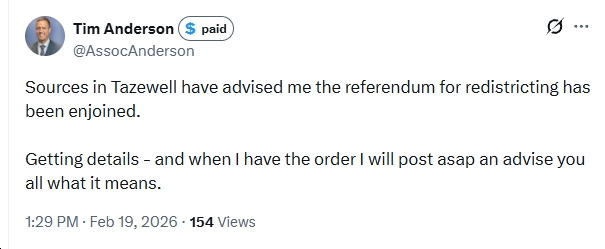A couple messages from smart Virginia politicos the past few days got me thinking – scary, I know! So first, here’s what they said, slightly paraphrased:
- Smart Virginia politico #1: “I think people underestimate how much harder the information environment [for Democrats] is today when compared to 2017”
- Smart Virginia politico #2: “Virginia Democrats have the issues and the money, Virginia Republicans have an [information/media disinformation/misinformation] ecosystem.”
Now, I certainly agree that the media environment has been deteriorating for years, both in terms of its quality, but also in terms of its bias against Democrats and towards Republicans (whether explicitly or implicitly, intentionally or not); I’m just not sure *how much* worse. In thinking about this topic, several data points jump out…both nationally and specifically with regard to Virginia politics.
- Nationally, between 2005 and 2024, the United States has lost over 3,300 local newspapers, with the decline accelerating to nearly 2.5 newspapers closing each week by late 2024, according to Northwestern Medill research. This loss has resulted in an expanding ‘news desert,’ where counties have little to no local news sources, affecting millions of people.”
- Interestingly, “There’s been a net increase of 81 stand-alone local digital news sites, the biggest one-year gain in recent years. About one-third of them are less than five years old. That gain, however, includes 30 newspapers that converted from print to digital. Nearly 90% of them are in metro areas, not in hard-hit rural counties.”
- According to Northwestern University’s “State of Local News” report, total newspaper employment declined from 365,460 in 2005 to just 98,470 in 2023 (presumably it’s even lower now), a 70% decline. And newspaper employment specifically in the newsroom fell from 75,000 in 2005 to just 29,920 in 2023 (again, it’s presumably still falling).
- What impact does this decline in newspapers have on US politics? According to Northwestern University: “Donald Trump won the 2024 election with one of the smallest popular-vote margins in U.S. history, but in news deserts – counties lacking a professional source of local news – it was an avalanche. Trump won 91% percent of these counties over his Democratic rival, Kamala Harris, according to an analysis of voting data by Medill Journalism School’s State of Local News project. While Trump’s national popular-vote margin was just under 1.5%, his margin in news deserts was massive. He won these counties by an average of 54 percentage points.”
- Of course, as Northwestern University article points out: “Trump’s dominance of news deserts doesn’t imply a cause and effect. That is, people didn’t necessarily vote for Trump because they lack local news. Instead, a simpler and more obvious correlation may be at work: News deserts are concentrated in counties that tend to be rural and have populations that are less educated and poorer than the national average–exactly the kind of places that went strongly for Trump in 2024 and in 2020…When voters lose access to local news, they tend to gravitate toward national news sources, according to research by Joshua P. Darr, a professor of public communications at Syracuse University. This kind of news, by definition, focuses on broad national issues—abortion, immigration, the economy, etc.—without regard to local conditions.”
- According to former Sen. Jon Tester, ” the decline in local media was one of the biggest changes he saw over the 18 years he spent in the U.S. Senate.” And, former Sen. Tester adds, “Now, we just don’t have the reporting, so people just don’t have the facts, and then you have all this bullshit about everything’s fake news unless it’s fake news, and then it’s real.” Disastrous, in other words.
- Here in Virginia, the decline in print media has been precipitous. The Virginia Mercury’s Ned Oliver reported on this back in 2018, and found that between 2010 and 2018, newsroom staffing at the Richmond Times-Dispatch from 42 to 26 reporters (and from 20 to 13 editors), with similar cuts at The Virginian-Pilot (a decline from 67 to just 33 reporters) and The Roanoke Times (down 35%). And presumably, things have only gotten worse since 2018 (e.g., the Richmond Times-Dispatch lost Virginia politics guru Jeff Schapiro recently).
- Virginia newspapers’ home circulation has declined sharply: “For example, the Richmond Times-Dispatch and the Virginian-Pilot, which once had circulations near 200,000, fell to around 57,695 and 51,284 respectively, including digital replicas, by 2023.” And “From 2004 to 2019, total daily and weekly newspaper circulation in Virginia fell by 38%.” As for the Washington Post, its paid daily circulation declined from 726,000 in 2004 to just 97,000 (!!!) this year – an incredible 87% decline!
- Of course, there’s been a rise in digital news outlets, such as the Virginia Mercury, Virginia Scope, Cardinal News, etc. And while they do good work in many ways, they’re not really the same thing as having a local newspaper – or a physical newspaper, for that matter, as the experience between “consuming” news from a physical paper or magazine vs. online is VERY different.
- Another chance over the past few years has been a decline in newspapers making political endorsements. For instance, in 2013, Terry McAuliffe was endorsed for governor over Ken Cuccinelli by the Daily Press, Virginian-Pilot and Washington Post. Similarly, in 2017, Ralph Northam was endorsed over Ed Gillespie by the Daily Press, Virginian-Pilot and Washington Post. But in 2021, only the Washington Post endorsed Terry McAuliffe. And this time around, I’d be shocked if the Washington Post made any endorsements, after Jeff Bezos killed the paper’s 2024 endorsement of Kamala Harris, with the paper’s publisher and CEO saying the paper would never endorse in a presidential election again. But, you say, this isn’t a presidential election we’re having in Virginia this year. True, and it’s theoretically POSSIBLE that the WaPo could endorse Abigail Spanberger this time around (it’s almost inconceivable that they’d endorse Winsome Earle-Sears), but much more likely, the paper won’t make any endorsement. So that’s a net negative for Democrats compared to the past few elections, when the WaPo endorsed Terry McAuliffe, Ralph Northam, and then Terry McAuliffe again.
- As for the WaPo’s and other Virginia political news outlets “straight-news reporting,” I’d argue that it overwhelmingly falls in the categories of: “horserace,” “both-sides,” false equivalence, faux-“neutral” (as the saying – which is at the top of UVA Professor Larry Sabato’s Twitter feed – goes, “The hottest places in hell are reserved for those who, in times of great moral crisis, maintain their neutrality”), “access journalism” (an oxymoron if there ever was one, because in the quest to maintain access, it’s almost inevitable that real journalism – hard hitting, muckraking, etc. – will be sacrificed, so as to say on good terms with those you’re covering), stenography (check out the WaPo’s Virginia political coverage in particular for numerous examples of that), whitewashing and “sanewashing” (again, check out the WaPo’s coverage of Virginia politics for superb examples of those phenomena), etc. And no, none of those styles of reporting benefit Democrats; while all of them – explicitly or not, intentionally or not – benefit Republicans.
- Meanwhile, Democrats nationally and in the states almost completely failed over the past couple decades to build a serious media and messaging machine, while Republicans and the right wing built a MASSIVE echo chamber – whether on talk radio (utterly dominated by right-wing talk), cable TV (again, the right-wing dominates, via outlets like Fox “News,” OANN, Newsmax, etc., with CNN doing “both sides” reporting at best), broadcast TV news (most of which are now corporate-owned-and-operated, which means they’re often conservative leaning or anti-Democratic or whatever), print media (just as with broadcast TV news, many of our major papers – the WaPo, LA Times, Wall Street Journal, etc. – are now owned by right-leaning billionaires, corporations, etc.) and online (see here for my article on how Democrats: a) failed to invest in building an online media ecosystem, while the right-wing most definitely did so; b) actually were hostile/scornful towards the online pro-Democratic media that existed, such as the “SoapBlox” network of state-based pro-Democratic blogs); c) never seemed to grasp the power of online media, even though it was glaringly obvious that this is where people increasingly were getting their information (or, more to the point, misinformation and disinformation), and even though right wingers clearly figured it out; d) still, to this day, don’t seem to “get it,” or invest accordingly, a failing that almost certainly played a major role in Donald Trump’s victory over Kamala Harris in November 2024.)
- Last but not least, we’ve had a massive shift against Democrats (and democracy) the past few years on Twitter (bought by Elon Musk in October 2022, and now reflecting Musk’s priorities, including HEAVY promotion of his own far-right views, as well as algorithm boosting of right-wing content and heavy supression of pro-Democratic content) and Meta/Facebook (“Multiple recent analyses suggest Facebook’s algorithm continues to amplify right-wing content, aligning with long-standing criticisms of political biases and profit incentives.”; “A 2022 study found that a 2018 Facebook algorithm update boosted local Republican Party groups, causing them to receive more engagement than their Democratic counterparts.”). Arguably, this shift – along with Elon Musk’s massive donations on behalf of the Trump campaign – made the difference in the 2024 presidential election, resulting in the collapse of our democracy, the trashing of the federal government, etc, etc. Total disaster, in other words; and Democrats, for whatever reason, did NOTHING over the years to stop any of this. WTF was THAT all about?
So, bottom line, for all these reasons, I’d argue that it’s indisputably true that, as Smart Virginia Politico #2 said, “Virginia Democrats have the issues and the money, Virginia Republicans have an [information/media disinformation/misinformation] ecosystem.” As for Smart Virginia Politico #1, who said that they “think people underestimate how much harder the information environment [for Democrats] is today when compared to 2017,” I’d argue that it’s definitely a worse environment than in 2017, but more broadly that the information environment has been deteriorating, from a Democratic perspective, for a couple decades now, with a definite worsening the past few years due to the change of ownership at Twitter, more right-wing bias at Meta, Jeff Bezos’ trashing of the WaPo, the continued decline/decimation of local news outlets, etc. So yeah, Smart Virginia Politico #1 and #2 are both correct, which is just one of several major reasons why Democrats can not and should not take this election – or any election – for granted, ever. Because sure, voters agree with Democrats on a ton of issues, and presumably are not happy with many Trump/DOGE policies, but if they only get their information (or more to the point, misinformation) through right-wing or “both-sides” filters, will they fully understand the importance of voting Democratic this November, or any November? Maybe, but the Republican-friendly/right-wing-dominated media ecosystem sure doesn’t help in that regard…






![Sunday News: “Trump Is Briefed on Options for Striking Iran as Protests Continue”; “Trump and Vance Are Fanning the Flames. Again”; “Shooting death of [Renee Good] matters to all of us”; “Fascism or freedom? The choice is yours”](https://bluevirginia.us/wp-content/uploads/2026/01/montage011126.jpg)











